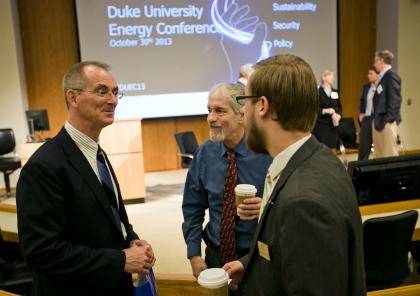
Human-driven climate change is real -- and so is the opportunity for government to combat it without hurting the energy industry or the economy, an ex-congressman told a Duke audience.
"We're not talking some altruism here, but rather a free enterprise fix that makes it so you fix the economy and the environmental problem fixes itself," former U.S. Rep. Bob Inglis, R-S.C., said in his keynote address to the Duke University Energy Conference on Wednesday.
The conference is designed to connect Duke University students and faculty with energy industry professionals, for increasing knowledge and understanding of energy-related issues within the Duke community and among businesses, government and other universities in the region.
The daylong conference included a number of panel discussions on topics ranging from energy markets and policy, to disruptive technologies, to energy consumers and demand-side management through gamification.
Inglis's address was one of two keynote presentations. At the event's close, two distinguished Duke alumni, Ralph Eads and Simon Rich, discussed unconventional U.S. oil and gas production with Energy Initiative Director Richard Newell.
Eads and Rich helped create the natural gas industry's "shale revolution." Eads, vice chairman of Jefferies & Co. Inc. and a 1981 Duke graduate, was among the first to comprehend the potential magnitude of natural gas production from shale and organized private financing on a scale that would support the resource's development. Rich, chairman of RKI Exploration and a 1967 alumnus, secured funding from Eads and joined forces with Jim Musselman, a 1970 grad, to apply the drilling technology necessary to produce natural gas from shale.
In his morning address, Inglis told the audience how he torpedoed his political career by changing his views from climate change denial to not just belief but activism, one of several "heresies against the Republican orthodoxy" that he said cost him his 2010 re-election bid in the GOP primary.
Last year, he helped found the Energy and Enterprise Initiative (E&EI), a nationwide public engagement campaign that explores and promotes conservative solutions to energy and climate challenges in the United States. E&EI is based at George Mason University's Center for Climate Change Communication.
One of the E&EI's showpiece crusades is a proposal for a revenue-neutral carbon tax plan that calls for imposing a tax on carbon pollution coupled with a cut in income or business taxes; making that carbon tax "border adjustable" by imposing it on imports and not exports; limiting government's role by ending all fuel subsidies and lightening environmental regulations; and returning carbon tax revenue to citizens through lower income taxes or a dividend.
Primarily due to political wrangling, there's no future in providing economic incentives for reducing the emission of pollutants to a set limit, otherwise known as cap-and-trade, Inglis said: "Cap and trade is graveyard dead."
But even his organization's "free enterprise fix" faces an uphill battle just to win a fair hearing in a political environment that remains stridently partisan and hostile. Inglis noted that, while progressive voters and politicians are more willing to listen to market-based ideas for combating climate change, hard-line conservatives simply consider it a nonexistent issue.
Simply believing that climate change is a real, human-driven problem "has become a cultural marker," Inglis said. "It indicates which tribe you're in," he said.